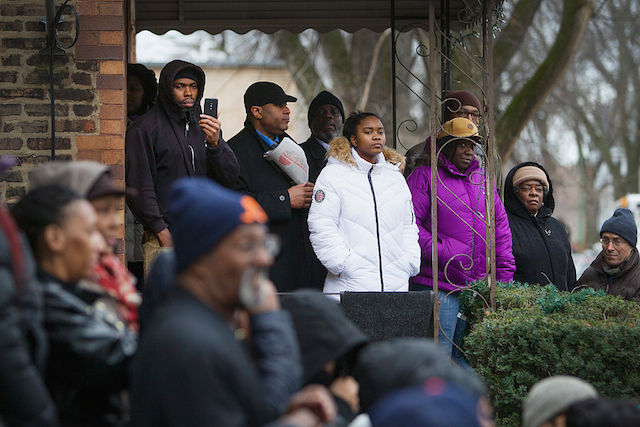Chicago Cop Sues The Estate Of Teen He Fatally Shot—For $10 Million
By Mae Rice in News on Feb 8, 2016 4:27PM

CHICAGO, IL - DECEMBER 27: Family, friends and supporters gather outside the home of Bettie Jones and Quintonio LeGrier during a vigil.(Photo by Scott Olson/Getty Images)
The police officer who fatally shot a teenage man and the teen’s unarmed neighbor is suing the teen’s estate for more than $10 million, saying his “atrocious” behavior before his death caused the officer “extreme emotional trauma,” according to the New York Times.
The full, nine-page lawsuit submitted by Officer Robert Rialmo and his lawyer, obtained by the Times, provides a detailed account of what happened on Dec. 26, the night Rialmo fatally shot Quintonio LeGrier, 19, and LeGrier’s neighbor Bettie Jones, 55.
That account is hotly contested, though. A lawyer for LeGrier’s estate, Basileios J. Foutris, told the Times that the suit was “pure fantasy.” Adam Collins, a spokesman for Mayor Rahm Emanuel, didn’t contest the facts of the suit specifically, but said that “the city does not support” the lawsuit “and is not involved in any way.”
According to the suit, Rialmo arrived at LeGrier’s address at roughly 4:20 a.m. on the morning of the shooting. He “rang the doorbell and knocked on the front door”-this is the level of detail in the document—and Jones let him in. She allegedly told him “It’s upstairs,” and returned to her first-floor apartment.
Soon after, the suit alleges that LeGrier emerged from his second-story apartment holding a baseball bat, and came down the stairs to the entryway where Officer Rialmo was standing. According to the suit, while the two were roughly four feet apart:
LeGrier… placed his left hand on the baseball bat which he was holding in his right hand, cocked the baseball bat back over his right shoulder, and took a full swing at Officer RIalmo’s head, missing it by inches, but getting close enough for Officer Rialmo to feel the movement of air as the bat passed in front of his face.The suit alleges that LeGrier refused Rialmo’s orders to drop the bat, and swung the bat at Rialmo a total of four times as Rialmo backed away. After LeGrier’s fourth swing, the suit alleges, Rialmo began to shoot at LeGrier. One shot, according to the suit’s account, passed through LeGrier’s left arm and hit Jones, who was standing out of Rialmo’s field of vision in the building’s doorway.
One of the final items of the suit argues that LeGrier’s behavior has caused Rialmo “extreme emotional trauma.” The document also cites Rialmo’s “pain and suffering,” “damage to person,” and unspecified “medical expenses” as reasons for the lawsuit.
Previously, we knew this lawsuit existed, but the public only understood the bare bones of the shooting incident: Officers arrived at LeGrier’s home in response to 911 calls about a domestic disturbance. (LeGrier himself called 911 three times that night, but was repeatedly hung up on by 911 operators; officials responded to a call from LeGrier’s father, Antonio.)
On the scene, Rialmo fatally shot LeGrier, who police termed “combative” and whose autopsy revealed a bullet wound in his back. Rialmo also “accidentally struck and tragically killed” Jones, according to the initial police statement.
The public consensus has been that LeGrier was killed in the midst of a mental health crisis, and the city has since revamped its policies for protocols for police interacting with mentally ill civilians.